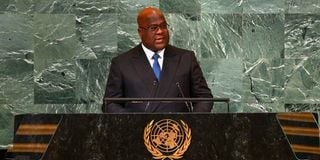UN lifts arms embargo on DR Congo

Democratic Republic of the Congo President Felix Tshisekedi addresses the 77th session of the United Nations General Assembly at UN headquarters in New York City on September 20, 2022. He had accused Rwanda of backing rebels. PHOTO | ANGELA WEISS | AFP
What you need to know:
- The lifting of the arms embargo on the DR Congo military has caused excitement for the Congolese government.
New York,
The United Nations Security Council (UNSC) has lifted an arms embargo on Democratic Republic of Congo (DRC), which gives it a leeway to buy heavy weapons that they have been yearning for to fight M23 rebels and other groups.
The members of the UNSC under resolution 2667 (2022) on Tuesday agreed unanimously that the arms embargo be lifted.
“Acting under Chapter VII of the Charter of the United Nations, decides that the notification requirements set out in paragraph 5 of the resolution 1807 (2008) shall no longer apply,” the UNSC resolution reads in part.
France, which is a permanent member of the UNSC, tabled the request to lift the embargo.
Earlier, China and Russia called for the lifting of the embargo to help the DRC protect its territorial sovereignty after losing battles against M23 rebels.
The DR Congo accuses Rwanda of supporting M23 rebels, but Kigali denies the claims.
The United Nations officials in DRC also indicated that M23 rebels had more firepower than the Congolese forces and UN forces.
The UNSC Resolution 1807 (2008) had put strict restrictions on the provision of arms and training to the Congolese government.
According paragraph 5 of the resolution 1807 (2008), all States had to notify in advance to the UN committee any shipment of arms and related materiel for the DR Congo, or any provision of assistance, advice or training related to military activities except those intended for the UN mission.
Three months ago, the Congolese authorities told the media that they bought arms from a foreign country, but they were unable to transport them to the DR Congo because shipping companies feared breaching the embargo.
The lifting of the arms embargo on the DR Congo military has caused excitement for the Congolese government.
Ms Tina Salama, the deputy spokesperson of DR Congo’s President Felix Tshisekedi, responding to the UNSC resolution, tweeted: “The Security Council has just put an end to the notification procedure in the event of the purchase of arms and military equipment. The FARDC can now equip themselves without hindrance. A resolution presented by France, and adopted unanimously.”
The Congolese government has been urging the UNSC to allow it to buy weapons to fight rebels and other groups that have made the country partly ungovernable.
M23 rebels have so far captured a sizeable territory and several towns on the Uganda-Congo border and they have cut off all major supply routes from Uganda to Goma City, which is one of the biggest cities in Eastern DR Congo, causing untold suffering to the civilians.
The UNSC also requested the Congolese government to provide a confidential report to them no later than May 21, 2023 detailing its efforts to ensure the safe and effective management, storage, marking, monitoring of their stockpile of weapons and ammunition, as well as efforts to fight arms trafficking and diversion.
For years, countries neighbouring the DR Congo have been accusing the Congolese government of failing to protect its weapons, thus landing in the hands of armed groups that end up using them to destabilise other states. Ugandan, Rwandan and Burundian rebels are said to be in the DR Congo.
The Council also voted to renew the mandate of the UN's DRC peacekeeping mission, MONUSCO, for another year.
The M23 or "March 23 Movement" first leaped to global prominence in 2012 when it briefly captured Goma, an important commercial hub of about a million people in North Kivu province.
A joint offensive by UN and Congolese troops drove the rebels out in 2013. But after lying mostly dormant for years, the M23 resumed fighting last year after accusing the government of failing to honor an agreement to incorporate its fighters into the army.
The DRC has accused neighboring Rwanda of backing the M23, which Kigali has repeatedly denied.






